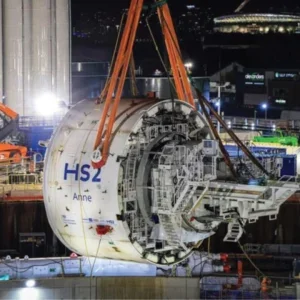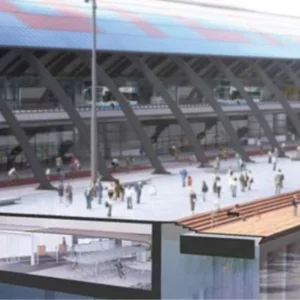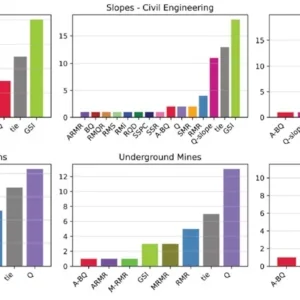Differences occur in ground conditions around the world, and every tunnelling project throws up its own unique challenges. But even with this in mind, there is an apparent regional diversity in the approach to waterproofing. In Norway, where sub-sea road tunnels present extreme conditions, waterproofing has become more a case of water control than prevention. Water ingress systems merely shed water away from the roadway, with the use of simple, free-standing, lining systems to prevent ice build-up (see p43). Granted, these lining techniques are assisted by the Norwegian geology and the use of advanced grouting systems in difficult zones. However, this open-minded approach contributes towards some of the most cost-effective tunnelling projects in the world.
By contrast, in other countries many clients are specifying completely ‘dry’ tunnels. A trend towards combining established waterproofing techniques to achieve these watertight requirements is also growing. Thomas Tepper, manager of the tunnelling department of German waterproofing supplier and installer, Naue Sealing, agrees. “It is becoming more and more common in Germany to aim for completely dry tunnels, especially for railway tunnels and road tunnels. This is mainly due to the fact that they are, more often than not, in areas that have problems with ice in the winter, as well as protection of sophisticated technical installations,” he said. However, Tepper recognises national differences in attitude, “specifications are influenced by regulations and standards that are enforced in each country worldwide. This is particularly the case when discussing fire protection and water sealing.”
The waterproofing solution will, in most cases, be determined by its application: tunnelling method, prevailing ground conditions, level of the water table, and the design of the tunnel lining. Manufacturers also now offer a variety of systems, each catering for differing installation and logistical requirements.
Trial and error
The majority of waterproofing products such as concrete additives, waterstops and seals, injection systems and flexible sheet membranes, are tried and tested and their use extensively published. This has not always been the case and there have been well-documented problems with products in the past.
One report based on flexible sheet membrane data collected from the 1960s and 1980s stated that only 50% of sheet membranes were successful if under persistent water pressureà. Largely, these problems were due to the lack of experience of the installers, or through damage to the membranes following completion of construction. Although not representative of membrane performance in today’s market, such papers do demonstrate the importance of product development, not only in terms of what is sold, but also in its application and installation.
This emphasis on the learning process is still evident today. Numerous new products are being introduced which will also require project trials and references. “As an installer you are always interested in new products that offer clients cost-effective alternatives,” Tepper says. “The learning curve is the problem in these situations, you need projects where you can train your people… of course initially you may make mistakes and sometimes you will run into problems, but that is the nature of learning.”
Product developments
In recent years there has been a significant increase in the choice of quality concrete additives and joint sealing systems for tunnel waterproofing applications. An example of this is the Fuko Injection System, produced by US manufacturer, BBZ. This system involves a solid core PVC injection hose, which is permanently installed along the concrete construction joint, allowing resin or microfine cement injection, to seal any voids or cracks. “The hose is easily installed and can be cleaned and used again at a future date if leakage appears,” says Alun Thomas of Mott MacDonald. “What struck me when I first saw this type of system on the Jubilee Line Extension project was its simplicity. It’s very useful for junctions. There it was around a segmental tunnel where it entered the headwall of an enlargement. Currently we are using it at the junctions of SCL tunnels.”
Many new products are currently being developed in response to evolving underground construction techniques, such as complex station structures with multiple shafts, adits and connections. However, one of the biggest potential advances lies in the use of sprayed waterproof membranes, especially with regard to permanent shotcrete linings.
Sprayed waterproofing membranes
Water ingress in shotcrete lined tunnels is generally not through the shotcrete itself, but the joints and embedded steel. “The permeability results we’ve had from shotcrete material is very good, at 1×10-14m/s, which is virtually watertight,” explains Ross Dimmock, technical and marketing director for Swiss based manufacturer, MBT UCG. “The water doesn’t come through the panels, it comes through the construction joints. That’s where the problem lies,” he said.
“The construction joints are definitely the problem in SCL tunnels,” said Alun Thomas. “The disadvantage of current spray-on membranes is that they require a secondary lining inside to resist any water pressure. This conflicts with the concept of a one-pass sprayed concrete lining. A really exciting development is the new spray-on structural membranes. These polyurethane based products have been used for rock support in mines and could – in theory – be used as the initial sealing layer in a tunnel, and also provide the waterproofing. The beauty of this would be that the waterproofing would be exactly where you want it – outside the structural lining with all its joints.”
Permanent steel fibre reinforced shotcrete linings are increasingly being adopted for tunnel construction, but spraying against a flexible sheet membrane is problematic. Rebound is high, and obtaining grip often requires the use of steel mesh, which in turn poses a risk to the membrane integrity, and reduces the quality and durability of the shotcrete lining.
MBT’s Masterseal 340F spray applied waterproofing membrane is one of several new water-based elastic acrylic polymers, specifically designed to address these issues. More significantly, the system facilitates the construction of single-shell sprayed tunnel linings. Once applied, Masterseal forms a structural bond of 1MPa to adjoining concrete layers. This bond strength allows the structure to act monolithically, providing the potential to reduce total lining thickness (T&TNA, December 2002, p37-41). The bond, both on the inside and outside interfaces, also significantly reduces water travel around the exterior of the membrane.
Masterseal 340F has now successfully been used on several underground construction projects, including tunnels in Brazil and Chile and cross passages for MTRC in Hong Kong. “We have had a lot of success in Latin America and Hong Kong. We’ve had a few failures also, like Hull [in the UK], where it was frozen ground,” Dimmock explains. “Masterseal 340F relies on drying out before you can spray over it, so in very wet tunnel conditions it’s not ideal. But in semi-dry to damp conditions, where you want 100% watertightness, it is fine.”
In response to project feedback and with a number of trials underway in Hong Kong and the UK, MBT is shortly due to release a faster curing version of the product, which is ready to be sprayed over, with shotcrete, within a couple of hours of application. Named 345, the new dry compound is mixed with water at the spray nozzle and can be applied using standard dry shotcreting equipment.
Both of the Masterseal systems require the use of a geotextile fleece in areas of direct water ingress, in order to allow the product to dry. They also require a fine-graded shotcrete mix design (0mm-8mm grade is suggested) in order to minimise application thickness.
The way forward
It is often the case when developing new products, that unexpected benefits can result in altogether new approaches to techniques. However, the trial and testing phases of these products often prove crucial to their ultimate success in the marketplace. It is important to remember that keeping an open mind in these instances, can enable the industry as a whole to move forward.
Carbotech Fosroc
Tel: +49 201 172 1320
Fax: +49 201 172 1097
Email: info@carbotechfosroc.com
Carbotech Fosroc produces a range of waterproofing solutions including injection systems, admixtures, grouts and pipeline coatings as well as tools and equipment. Its injection systems are based on component polyurethane resins, organo-mineral resins, acrylates and micro cements.
DeNeef Construction Chemicals
Tel: +1 936 372 9185
Fax: +1 936 372 9897
Email: info@deneef.com
DeNeef manufactures and distributes a variety of water control and soil stabilisation products for the civil engineering industry such as Hydro Active polyurethane chemical grouts, the AC 400 acrylate chemical grout and a range of microfine cements. Recent additions to its range include Gelacryl, a two-component acrylic resin that can be injected into pores, capillaries, cracks, voids and honeycombed concrete. Once polymerised it forms a resilient, highly elastomeric gel, which is non-corrosive, non-toxic, and resistant to most solvents.
Elkem Materials
Tel: +47 38 01 7500
Fax: +47 38 01 4970
Email: tor-soyland.hansen@elkem.no
Elkem has developed the Multi-Grout rock injection system for tunnels and storage caverns. The system combines water blocker, timer, penetrator, cement and dispersant offering a reduction in groundwater in-leakage, control of settlement, reduction or elimination of waterproof membranes and contaminated water disposal. The system was developed in answer to issues such as pre-grouting, post-grouting, large volume and/or high-pressure inflows, shallow overburden weakness zones and sensitive environmental constraints. The system has been successfully applied on several recent projects including the Storhaug and Romeriksporten tunnels.
Flag
Tel: +39 035 494 0949
Fax: +39 035 494 0649
Email: seregni@flag.it
Some 50,000,000m² of Flag waterproof membranes have been applied all over the world, since the 1960s. The Flagon synthetic membrane system is used in numerous countries including, Austria, Italy, Ireland, Croatia, Portugal, France, China, Vietnam and Malaysia. Answering various field technical requests, Flag recently developed five new membrane products.
Grace Construction Products
Tel: +44 1753 637613
Fax: +44 1753 637677
Email: chris.vonpatzelt@grace.com
Grace Construction Products has pioneered the development and use of Bituthene self-adhesive membrane systems. Continuing development of the technology has led to the introduction of Preprufe, a multi-layered waterproof membrane that forms a continuous mechanical bond with wet concrete poured against it, making application simpler and more reliable. Procor is a liquid-applied waterproof membrane for sub-structures and elevated decks.
Greenstreak
Tel: +1 800 325 9504
Fax: +1800 551 5145
Email: info@greenstreak.com
US manufacturer, Greenstreak, has been providing waterproofing products for tunnelling projects since 1950. Products include waterstops for concrete construction joints: the Hydrotite® system, the Fuko PVC solid core injection hose, the Swelltop® waterstop and the Lockstop® waterstop. The Hydrotite hydrophilic waterstop is a modified chloroprene rubber that can expend up to eight times its volume on contact with water.
MBT International UCG
Tel: +41 1 438 22 10
Fax: +41 1 438 22 46
Email: ross.dimmock@mbt.com
MBT UGC has a wide range of waterproofing systems for underground construction. The latest Masterseal 340 and 345 spray applied waterproofing membranes bring both a much-needed flexible and safe systems to the underground construction market, with the added benefit of reduced construction costs achieved through single shell shotcrete linings. Water ingress control is achieved with the Rheocem range of fast-setting microcements and unique, highly penetrating MEYCO MP colloidal silica gels for tunnel pre-injection techniques into rock and sands, as successfully used in Scandinavia, Hong Kong and Australia.
Naue Sealing
Tel: +49 5741 4080
Fax: +49 5741 4008 40
Email: info@naue.com
Naue Sealing produces a range of geosynthetic materials for different tunnelling applications. One of the company’s solutions for substrates subjected to high hydraulic pressures as well as areas of seepage is to use a Carbofol polyolefin geomembrane, with a Secutex non-woven geotextile to protect from rough surfaces such as shotcrete. Geosynthetic drainage systems such as Secudrain can also be used to transport and discharge groundwater or seepage. Welding of seams and repairs is carried out with welding equipment by certified installers.
Rascor Group
Tel: +41 1857 1111
Fax: +41 1857 1100
Email: info@rascor.com
One of Rascor’s newest introductions is its White Tank water impermeable concrete, part of the RASCOtec preventative waterproofing system. Tested on the Zurich Airport scheme, White Tank provides a waterproof barrier, the joints being sealed by specially incorporated units, without the need for bituminous membranes. RASCOflex, an acrylic grout with a viscosity comparable to water, allows the finest cracks to be grouted. It is solvent free, and is fire resistant and non-flammable. Controlled swelling with 10%-15% increase in volume occurs upon contact with water, causing negligible pressure build-up. A waterproof barrier is achieved through the swelling action.
Sarnafil Group
Tel: +41 41 666 9966
Fax: +41 41 666 9700
Email: info-sarnafil@sarna.com
Sarnafil has provided waterproofing solutions for more than 100 excavated and open-cut tunnels. Its systems range from single-ply membranes for simple structures to sophisticated test and injection systems for the most demanding projects. The simple, loose-laid, single-ply system can be extended to a compartment system by using waterstops or fully adhered membrane strips to create cells, limiting leakage in case of damage. Each cell is fitted with an injection nozzle to enable repair work, restoring water-tightness in any damaged cell. Sarnafil also provides leakage run-off systems and accessories.
Sika Tunneling & Mining
Tel: +41 56 649 3276
Fax: +41 56 649 3204
Email: info@aliva.com
Sika AG manufactures a wide range of waterproof membranes, waterstops, seals admixtures and grouts, and has established a global presence in the tunnelling industry for quality and durability. For more information on Sika products, equipment and tools please visit its website at www.sika.ch.






